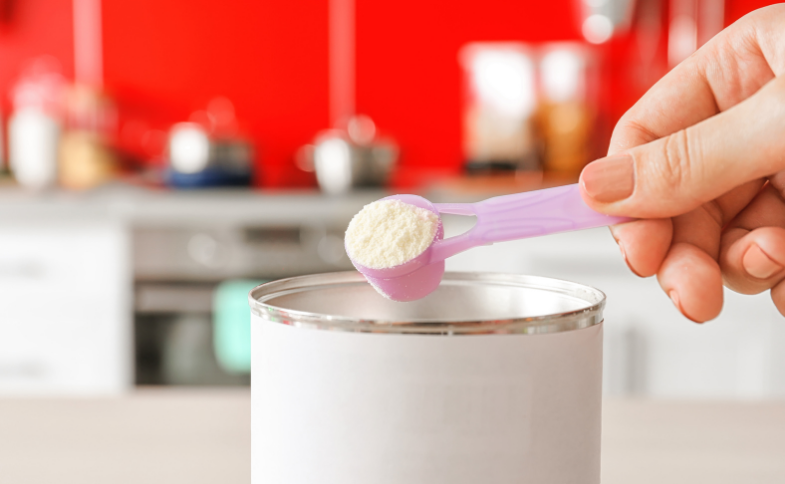How to Choose the Best All-Natural Organic Formula for Your Newborn
If you are a new parent who has decided to formula-feed your little one, you might be wondering what your best options are. You obviously want to give your newborn the best nutrition possible. At the same time, you want to avoid any harmful chemicals or additives that might be lurking in some baby formulas. That’s where organic formulas come in.

All-natural organic baby formula is made using ingredients that are free of harmful chemicals, antibiotics, hormones, or GMOs. They also have to meet strict standards set by the USDA National Organic Program. This allows them to offer some unique benefits for your baby’s health and development, such as reducing the risk of allergies, eczema, and digestive issues.
Sounds great, right? Well, not all organic formulas are created equal. There are many options available in the market, all with different ingredients, nutritional values, tastes, and prices. So how do you choose the best option for your newborn?
In this article, we will guide you through exactly what you need to do to choose the best all-natural organic formula for your little one.
Factors to consider when choosing an organic formula.
- Organic certification
Organic certification is a label that indicates that the formula meets the standards set by the USDA National Organic Program. It means that the formula that has it has at least 95% of the ingredients grown without pesticides, synthetic fertilizers, antibiotics, hormones, or GMOs.
With organic certified formula, you ensure that your newborn is not exposed to any harmful substances that might affect them. To know whether or not your formula brand has organic certification, look for the USDA Organic seal on the formula package. Also, consider avoiding formulas that have artificial preservatives, colors, or flavors.
- Type of milk
The type of milk used in the formula can be either cow’s milk or goat’s milk. Both types of milk have pros and cons depending on your newborn’s needs and preferences.
Cow’s milk is more widely available and affordable than goat’s milk. It also has higher levels of folic acid and vitamin B12. However, it is more prone to causing allergic reactions, gas, bloating, and constipation than goat’s milk. Goat’s milk, on the other hand, is easier to digest and less allergenic than cow’s milk. It also has higher levels of calcium, magnesium, potassium, and prebiotics than cow’s milk. However, goat’s milk can also be more expensive and harder to find than cow’s milk.
- Carbohydrate source
The carbohydrate source in baby formula is basically the main ingredient that provides energy for your newborn. This is usually lactose, which is the natural sugar found in milk, or some other sweeteners, such as corn syrup, maltodextrin, rice syrup, or sucrose.
Your formula’s carbohydrate source can affect your newborn’s blood sugar levels, appetite, dental health, and weight gain. So you have to be careful about what you opt for.
Lactose is the most similar to breast milk and is easily digested by most newborns. It also helps with calcium absorption and brain development. However, some newborns may have lactose intolerance or sensitivity, which can cause diarrhea, gas, cramps, or vomiting.
Other sweeteners make the formula more palatable. They can also help with lactose intolerance or allergy issues. However, they can also cause dental decay, obesity, diabetes, or liver problems if consumed in excess.
Go for brands that have lactose as the primary carbohydrate source if your newborn does not have any issues with it. You should also try to avoid formulas that have high amounts of other sweeteners or artificial sugars.
- Other Ingredients
Your baby’s formula will typically be made using organic or conventional ingredients. They can have different functions such as providing protein, fat, carbohydrate, vitamins, minerals, prebiotics, probiotics, and so on. This is what determines the nutritional value and quality of a formula.
The ingredients in the formula will not only affect your newborn’s growth and development but also affect their taste preferences over time. Depending on the ingredients, they may also cause allergies and intolerances in sensitive babies. For the best results, consider only using formula that contains ingredients that are organic certified.

Best organic baby formulas
Burt’s Bees Baby Organic Infant Milk Powder Ultra Gentle Formula
Burt’s Bees Baby Organic Ultra Gentle Infant Formula with Iron is designed for babies with sensitive tummies. It contains easy-to-digest proteins that help reduce fussiness, gas, and crying. It also provides vitamins D, E, and K along with calcium and DHA for brain development. The formula is gluten-free and made from cows that are pasture-raised on an organic diet.
Pros
- It is gluten-free and organic
- It contains gentle proteins and iron for digestion and growth
- Loaded with vitamins D, E, and K plus calcium and DHA for health benefits
Cons
- Sometimes foams up when mixed
- It can be hard to mix and has a strong odor
Earth’s Best Organic Infant Milk Powder Dairy Formula
Earth’s Best Organic Dairy Infant Formula is made from organic milk from cows that are fed organic grain and hay. It does not contain any genetically modified ingredients, artificial flavors, or preservatives. It is also rich in iron, and vitamins A, C, E, and K.
Pros
- It is organic and non-GMO
- Contains iron and vitamins A, C, E, and K for growth and immunity
- Rich in calcium, zinc, and DHA for bone health and brain development.
Cons
- May cause digestive issues in some babies
- May trigger allergic reactions in some babies
Similac Organic Infant Milk Powder Formula with Iron
Similac Organic Infant Formula is a milk-based formula that is certified USDA organic. It contains lactose like that found in breast milk, as well as iron, and vitamins A, C, and E. You will love that it is made with zero artificial flavors or preservatives.
Pros
- It is organic and non-GMO
- Contains lactose like that found in breast milk
- Provides iron, vitamins A, C, and E, calcium, and DHA f
Cons
- The formula may cause digestive issues or allergic reactions in some babies
- It has a strong smell and taste that some babies may not like
Baby's Only Organic LactoRelief Infant Milk Powder Formula
Baby’s Only Organic LactoRelief Infant Formula with DHA & ARA is a milk-based formula that comes with reduced lactose using a special enzyme process. It is designed for babies with sensitive tummies who experience fussiness, gas, or diarrhea from regular formulas.
Pros
- It is 100% organic and non-GMO
- It has reduced lactose for easy digestion
- Provides iron, vitamins A, C, and E, and DHA & ARA
Cons
- It may still cause allergic reactions in some babies
- It can be hard to mix and has a fishy odor
Earth’s Best Organic Sensitive Infant Milk Powder Formula
Earth’s Best Organic Sensitive Infant Formula with Iron is a milk-based formula that is modeled after breast milk. It also has a reduced lactose content and is designed for babies with sensitive digestive systems. It is certified USDA organic and non-GMO.
Pros
- It is organic and non-GMO.
- Comes with reduced lactose for sensitive tummies.
- Rich in vitamins A, C, E, and K
Cons
- It has a strong smell and taste that some babies may not like
- Sometimes it can foam up when mixed.

Final Thoughts
So there you have it; our collection of tips and tricks to help you select only the best organic formula for your newborn. We have also highlighted some of the top-rated organic baby formulas on the market to help ease the decision-making process for you.
We hope that with this article, you will be able to make an informed decision about your purchase. Remember that every baby is different and may react differently to different formulas. Always consult your pediatrician before switching or introducing a new formula to your baby. Good luck!